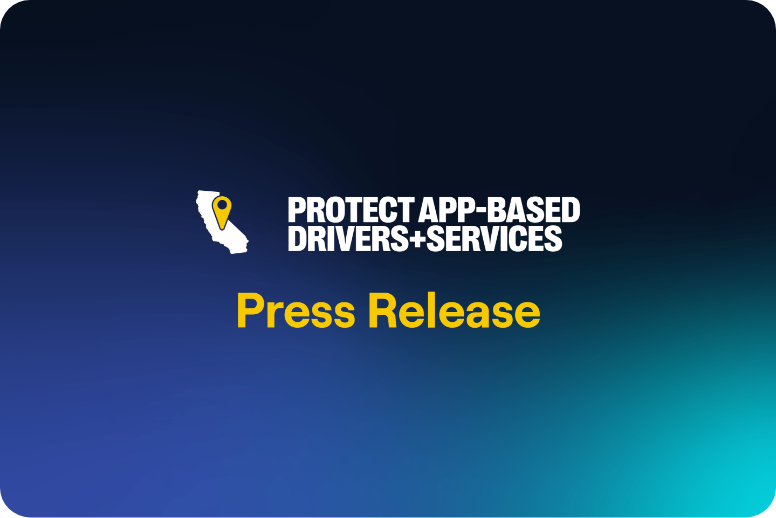By Bakersfield Californian Editorial Board
Proposition 22 on the Nov. 3 ballot is intended to protect thousands of California’s on-demand drivers, their customers, much-needed jobs and the state’s economy. It is the latest battle in a war between independent contractors and labor union advocates over California’s “gig economy.”
We urge Californians to vote YES on Proposition 22, which carves out yet another exemption in a poorly crafted state law that went into effect in January. The law reclassified many freelance workers – from translators to golf caddies to journalists – as “employees” and threatens to erase their job opportunities.
Assembly Bill 5, which was passed by the Legislature and signed by the governor, redefined who is a freelancer, or “independent contractor,” and who is an employee, who must receive company benefits and increased pay.
The legislation was passed in response to the California Supreme Court Dynamex ruling. Dynamex is a nationwide, on-demand, same-day, pick-up and delivery service. Prior to 2004, the company classified its California drivers as employees. In a cost-cutting move, Dynamex reclassified the drivers as “independent contractors.”
For 30 years prior to the court’s landmark 2018 ruling, California determined independent contractor status basically focusing on whether the “contractor” had control over the means and manner of the work performed; used his or her own work tools; had established a business; and was able to work for other clients.
The 2018 Dynamex ruling replaced that with an ABC test – Contractors are free from control or direction in work performed; perform specialized services that differ from a client’s usual business; and, maintain an independently established business offering services to clients.
But in crafting AB5, influential lobbyists were able to carve out exemptions for powerful industries and their workers — attorneys, real estate agents, insurance sales people, etc. Other workers were left to hope that legislators will pass the “fix it” law that is making its way to the governor’s desk.
The on-demand driver industry, which includes such popular services as Uber, Lyft, Door Dash, etc., isn’t waiting for a fix that likely will not give them much relief.
On Aug. 10, in a lawsuit filed against the on-demand companies by the state attorney general, a judge ruled that these on-demand companies must comply with the new state law. Uber and Lyft responded by threatening to pull out of California.
But on Aug. 20, they were given a reprieve, pending an October appellate court hearing. Hopefully before the case is decided, voters will pass Proposition 22 and declare on-demand drivers are independent contractors.
Fixing the mess legislators made when they passed AB5 should not be done one proposition and one fix-it law at a time. It should be done by overhauling the law and recognizing California’s labor market has changed. Many workers prefer the flexibility of being independent contractors – setting their own hours and supplementing their incomes with “freelance gigs.”
A survey by Rideshare Guy, an on-demand driver website, polled 1,000 drivers and found 71 percent wanted to remain independent contractors. Just 17 percent wanted to be employees.
Proposition 22 doesn’t just carve out an exemption for the industry. It sets standards for driver pay, benefits, training, etc. Opponents claim these new requirements don’t go far enough.
While most of the multimillion-dollar campaign to pass Proposition 22 is being financed by Uber, Lyft and Door Dash, the ballot measure has diverse support that includes black and Latino advocacy groups, such as the Hispanic Chamber of Commerce and the National Action Network, a civil rights group founded by the Rev. Al Sharpton. In a letter sent to elected officials in support of Proposition 22, activists, including the California State NAACP, noted that gig companies promote a “low barrier-to-entry way to earn income for those who often find traditional employment challenging.”
Kern officials working on behalf of DUI victims and offenders also weighed in on the possibility of ride-sharing companies pulling out of California.
“Uber and Lyft make it so much easier for someone to go out for dinner or drinks and just use their phone to get a ride with no excuses,” Kern County Sheriff Donny Youngblood said. “We know it reduces the number of people driving under the influence.”
Carla Pearson, a victim specialist with Mothers Against Drunk Driving Kern County, told The Californian, “Our opinion is that Uber wants to save lives and if they do leave our community, there will be a huge impact.”
Vote YES on Proposition 22 and then insist legislators repeal and replace AB5 with practical legislation that recognizes the reality that California’s gig economy is here to stay, and should be allowed to stay.
The Latest News

Press Releases
California Supreme Court Unanimously Upholds Prop 22 in Historic Ruling
Date: July 25, 2024 Contact: Molly Weedn, (415) 209-4217 [email protected] California Supreme Court Unanimously Upholds [...] Read more
Press Releases
PADS Responds to Conclusion of Oral Arguments on Prop 22
Date: May 21, 2024 Contact: Molly Weedn, (415) 209-4217 [email protected] The Coalition to Protect App [...] Read more